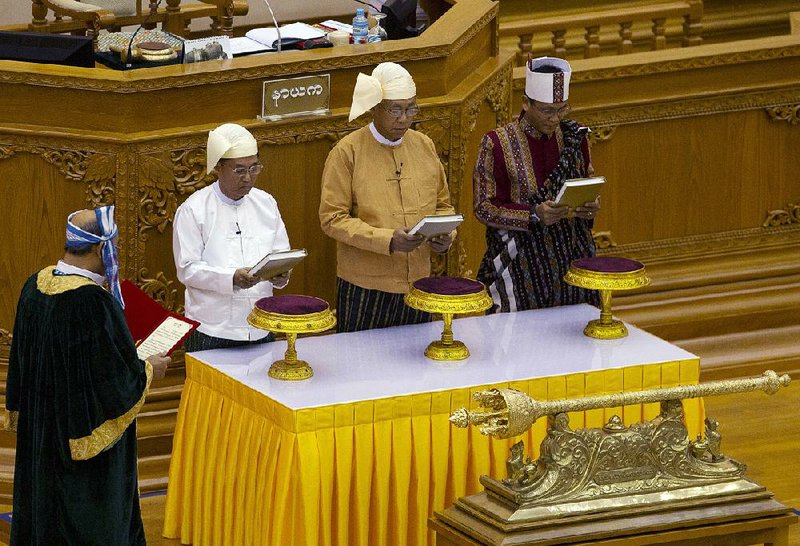NAYPYITAW, Burma -- Burma officially ended more than 50 years of military control over government on Wednesday as a trusted aide to ruling-party leader Aung San Suu Kyi took over as the country's president.
In a day full of ceremony and symbolism, Htin Kyaw was sworn in along with his two vice presidents and 18 Cabinet ministers. Suu Kyi, the Nobel Peace laureate and face of Burma's pro-democracy movement, takes on a role as the country's new foreign minister and the head of three other ministries -- education, energy and the presidential office.
"The Union Parliament has elected me as president, which is a historic moment for this country," Htin Kyaw, 70, said in a speech after being sworn in. He pledged to work toward national reconciliation, strive for peace with warring ethnic rebels and improve the lives of Burma's 54 million people.
While it was a historic day for the impoverished Southeast Asian country, democracy remains incomplete. The military retains considerable power in the government and parliament, and the president will play second fiddle to Suu Kyi. She cannot be president because of a constitutional manipulation engineered by the military, and has repeatedly said she will run the country from behind the scenes.
"I am very happy that we have a president who represents people," said Mar Thin, 50, a street cleaner. She said she used to own 70 acres that she and her sister inherited from their father before the military kicked them out and appropriated the land for the Defense Ministry.
"I hope that the new government can solve the land confiscation problem and let us own our land as farmers. All we want is enough food and to live without fear. I hope that President Htin Kyaw will do that for us because Daw Suu promised us a lot of things, and we love her, too," Mar Thin said, using a nickname for Suu Kyi.
In Washington, President Barack Obama noted the continuing challenges for Burma in a statement in which he called Htin Kyaw's election "a historic milestone in the country's transition to a democratically elected, civilian-led government."
"Burma will face significant challenges going forward, including achieving broad-based economic development, advancing national reconciliation, and promoting the rights and freedoms of all its people," Obama said. "The United States looks forward to being a friend and partner of the new government and the people of Burma as they make progress toward building a more inclusive, peaceful, and prosperous future."
Htin Kyaw's swearing-in was held in an austere hall of the parliament, with lawmakers dressed in traditional costume. A few hours later, outgoing President Thein Sein shook hands with his successor and handed him a letter and a golden sash, officially transferring power.
Suu Kyi endured decades of house arrest and harassment by military rulers without giving up on her nonviolent campaign to unseat them. The constitutional clause that denied her the presidency excludes anyone from the position who has a foreign spouse or child. Suu Kyi's two sons are British, as was her late husband. The clause is widely seen as having been written by the military with Suu Kyi in mind.
The constitution, drafted under the former junta, reserves 25 percent of the seats in the parliament for military officers, guaranteeing that no government can amend the constitution without the army's approval.
Information for this article was contributed by Matthew Pennington and Josh Lederman of The Associated Press.
A Section on 03/31/2016

